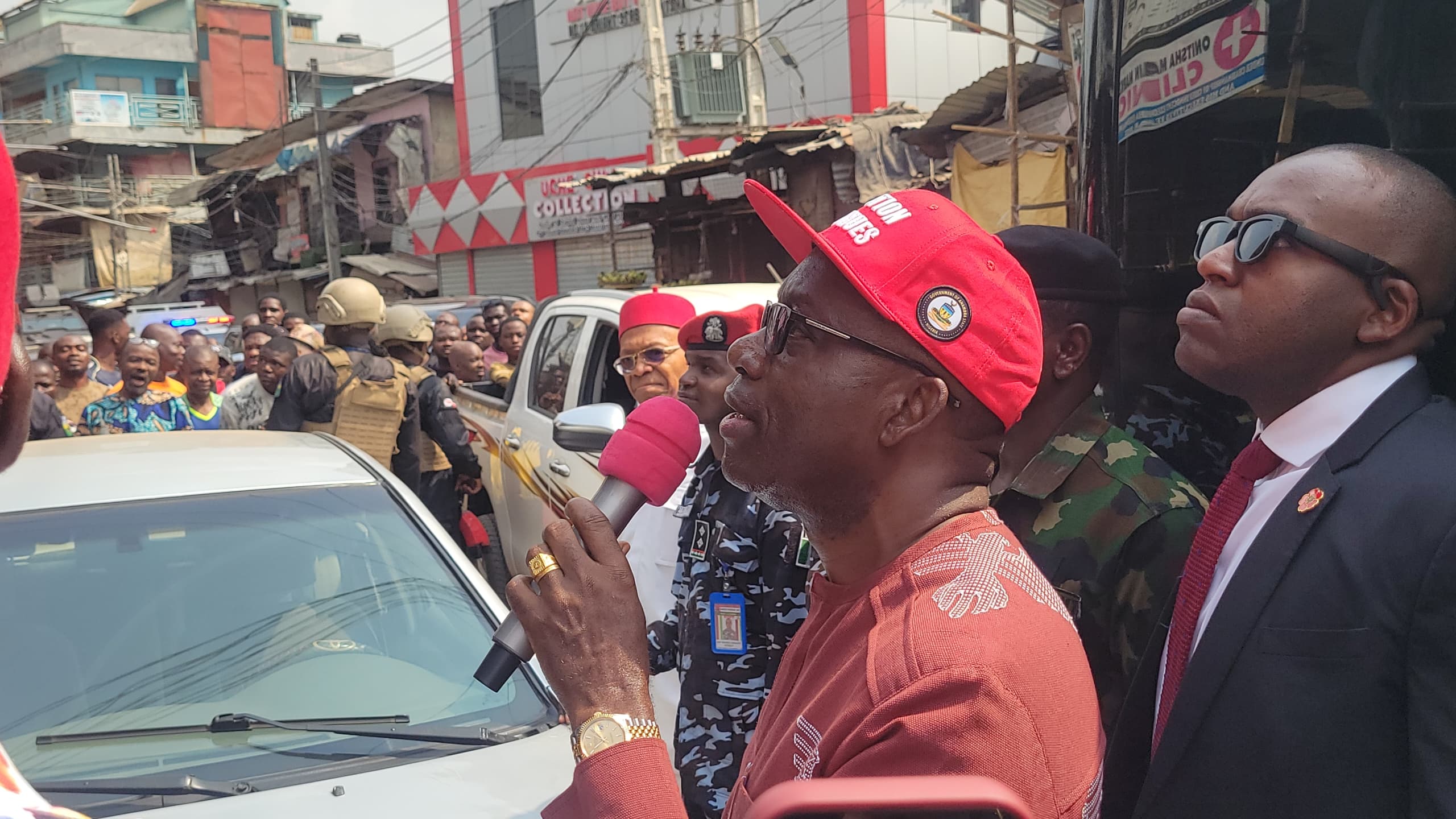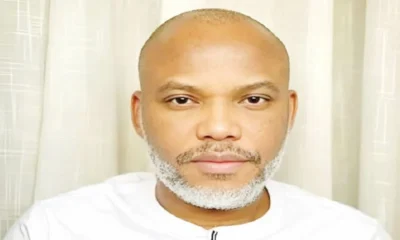EVENTS
IGP ENGAGES STAKEHOLDERS DURING OFFICIAL VISIT TO ADAMAWA STATE, CONDOLES WITH FAMILY OF DECEAS£D INSPECTOR

Affirms Commitment to Improved Security Architecture
The Inspector General of Police, IGP Kayode Adeolu Egbetokun, Ph.D., NPM, conducted a significant official visit to Adamawa State on November 28th, 2023. The visit, prompted by a recent attack on the Adamawa State Police Command by soldiers leading to the tragic death of Police Inspector Jacob Daniel, included critical discussions with key stakeholders. This included meetings with His Excellency, the Governor of Adamawa State, Rt. Hon. Ahmadu Umaru Fintiri, and His Royal Highness Lamido of Adamawa, Muhammadu Barkindo Aliyu Mustapha.
During the visit, the IGP underscored the necessity for collaborative efforts between the Nigeria Police Force, the state government, and traditional institutions to enhance the safety and well-being of Adamawa State residents, and address emerging security challenges. A crucial aspect of the visit involved an interactive session at the Command headquarters, where the IGP met with officers and men led by the Commissioner of Police, CP Afolabi Babatola Adeniyi. Commending the officers’ dedication, the IGP pledged continuous support for their efforts in maintaining law and order. He emphasized the importance of harmonious collaboration between officers and members of other security agencies noting that the NPF is not at w@r with other agencies. He also reassured them of improved welfare and training.
Accompanied by key officers, including the supervisory Deputy Inspector General of Police for the North East, DIG Bala Ciroma; DIG Department of Operations DIG Ede Ayuba Ekpeji; AIG Airwing, Danladi Lalas, and the Force Public Relations Officer, ACP Olumuyiwa Adejobi, the IGP expressed deep condolences to the family of Inspector Jacob. He assured them of justice and conveyed appreciation for the donations made by the Police Community Relations Committee Chairman, Adamawa Concerned Citizens Association, and the Hunters Association in support of the deceased officer’s family during this challenging time.
The Inspector General of Police extended gratitude to the Governor, His Royal Highness Lamido of Adamawa, and the people of the state for their unwavering commitment to ensuring a safe and secure environment. He reiterated the police force’s dedication to continuous collaboration with the government and traditional institutions in fostering lasting peace and security in Adamawa State.
ACP OLUMUYIWA ADEJOBI, mnipr, mipra, fCAI,
FORCE PUBLIC RELATIONS OFFICER,
FORCE HEADQUARTERS,
ABUJA
28th NOVEMBER, 2023
EVENTS
GOVERNOR SOLUDO’S ULTIMATUM AND THE BATTLE FOR ANAMBRA’S MONDAYS, SHUTS DOWN ONITSHA MAIN MARKET FOR A WEEK

By Christian ABURIME
Anambra State Governor, Prof Chukwuma Charles Soludo has ordered the immediate shut down of the Onitsha Main Market for one week, following defiance of the market leadership to open, against government directive.
Governor Soludo’s order for a one-week shutdown of the sprawling market is more than an administrative penalty. It is the latest, and perhaps most drastic, salvo in a protracted war over who controls time and economic life in Southeast Nigeria on mondays. The enemy is the long-standing, fear-enforced Monday sit-at-home order, a ghostly mandate from non-state actors that has strangled businesses and normalized weekly monday sit-at-home for years.
The Governor’s move is a direct response to what the government sees as baffling defiance. Despite repeated assurances of enhanced security and appeals to reclaim public spaces, many traders at the iconic market again chose to keep their stalls locked. Their absence was a quiet rebellion, but one that spoke volumes about the lingering climate of apprehension.
“The government cannot stand by while a few individuals willfully undermine public safety and disregard official directives meant to restore normalcy, this is plain economic sabotage. We are not going to allow this”, Governor Soludo stated, framing the closure as a protective measure for the “law-abiding citizen.” But his subsequent warning carried the weight of an escalating ultimatum: if the market does not reopen for business after this one-week shutdown, it will be sealed for a month. “And so on and so forth,” he added, drawing a line in the sand.
“You either decide that you are going to trade here or you go elsewhere. I am very serious about this”, the Governor insisted.
The scene at the market was one of tense enforcement. A joint task force of police, army, and other security personnel moved swiftly to secure the perimeter, turning away the few hopefuls who approached.
For the Soludo administration, the solution is unwavering enforcement to break a psychological barrier. The strategy is clear: make the cost of compliance with the illegal sit-at-home order higher than the fear that drives it. By targeting the economic heart of the region, the government aims to trigger a collective shift in behavior, betting that the traders’ desire to trade will ultimately outweigh their fear.
As the gates remain locked this week, the standoff in Onitsha encapsulates the broader struggle in the Southeast. It is a fight over normalcy, authority, and the fragile psyche of a populace caught between enforced directives and imposed orders. When the gates are scheduled to reopen next Monday, all eyes will be on the traders. Will they return to their stalls, emboldened by the state’s show of force? Or will the silent, empty aisles deliver a different verdict?
The answer will determine not just the fate of a market, but the rhythm of life in Anambra for Mondays to come.
https://www.instagram.com/reel/DT-PAX-DIAi/?igsh=bzVxOGgzcTF0OG5k
EVENTS
Man Goes Viral After Posting 17-Year Throwback Photos Of Him And His Wife

A Nigerian man has gone viral on X (formerly Twitter) after sharing throwback photos of himself and his wife from when they were both still children.
In the post, @Sadeeq_Malo revealed that he has loved his wife for 17 years, describing her as his uncle’s daughter, a statement that immediately caught the attention of social media users.
Sharing the photos, he wrote:
“17 years of love. I fell in love with her from the day she was born — my uncle’s daughter, now my bride. Allahummah Barik.”
The old photos, which show the couple as children, were shared alongside recent pictures of them as a married couple, sparking massive engagement online.
The post has since divided opinions on social media. While some users defended the union noting that cousin marriages are culturally acceptable in some communities, others focused on the unusual wording of his declaration.


Reacting, one user wrote, “Fell in love from the day she was born? That sentence alone is wild.” Another commented, “People should calm down. Cousin marriage is normal in many cultures.”
Despite the mixed reactions, the man appears unfazed, celebrating what he describes as a 17-year journey of love that eventually led to marriage.
Check post below….

EVENTS
The Moment IShowSpeed Declared Nigerian Jollof The Best After Tasting Liberian Jollof (Video)

IShowSpeed, the popular American streamer, has re-sparked the long-running jollof rice debate after trying Liberian jollof during his ongoing tour of Africa.
In a clip, the 21-year-old content creator was seen tasting Liberian jollof rice for the first time.
After reacting to the flavour, he admitted it was good but maintained that Nigerian jollof remains his favourite.
“I’ve have to be honest, it’s good… but I think Nigerian’s is better,” he said in the clip.
The comment immediately sparked reactions across social media, especially among Nigerian users who flooded comment sections celebrating his verdict, while others from different countries reignited the friendly West African jollof rivalry.
IShowSpeed, whose real name is Darren Watkins Jr., has been touring several African countries, sharing his experiences with local food, culture, and fans through live streams and short videos.
-
Business1 year ago
US court acquits Air Peace boss, slams Mayfield $4000 fine
-

 Trending1 year ago
Trending1 year agoNYA demands release of ‘abducted’ Imo chairman, preaches good governance
-

 Politics1 year ago
Politics1 year agoMexico’s new president causes concern just weeks before the US elections
-

 Politics1 year ago
Politics1 year agoPutin invites 20 world leaders
-

 Politics1 year ago
Politics1 year agoRussia bans imports of agro-products from Kazakhstan after refusal to join BRICS
-
Entertainment1 year ago
Bobrisky falls ill in police custody, rushed to hospital
-
Entertainment1 year ago
Bobrisky transferred from Immigration to FCID, spends night behind bars
-
Education1 year ago
GOVERNOR FUBARA APPOINTS COUNCIL MEMBERS FOR KEN SARO-WIWA POLYTECHNIC BORI













